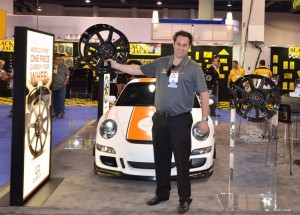A small Australian firm wants to reinvent the wheel.
Known as Carbon Revolution, the firm has developed what it claims to be the world’s first one-piece carbon fiber wheels. Super-light but extremely costly, CF is seen by many as the material of the future, at least for the auto industry. And the wheels offer many, if not more, advantages than using carbon fiber for automotive body panels and chasses.
The Australian start-up is pitching the wheels as a durable, light alternative to traditional aluminum alloy wheels. There is, of course, a trade-off at about $15,000 for a set of four. But company officials insist that if they can get their technology into mass production prices could plunge to a point where the carbon fiber technology could be competitive on mid-range luxury models or even more mainstream vehicles.
During a recent demonstration of the new technology, Carbon Revolution CEO Jake Dingle and Design Director Ashley Danmead demonstrated a pair of new wheels crafted for use on the latest Porsche 911. At barely 15 pounds for the front wheels and less than 18 pounds for the back, they weigh in at about 11 to 13 pounds less than Porsche’s stock wheels.
That might not sound like much but it adds up to nearly 50 pounds per vehicle. Consider the old rule of thumb suggests that every 100 pounds you cut from a vehicle’s mass translates into an extra mile per gallon and you can see how that’s a potentially big breakthrough for the auto industry. Automotive engineers would sell their souls for a tenth of an mpg.
The Carbon Revolution wheels have other advantages, Dingle claims. It means less unsprung mass, and that translates into improved suspension performance. In fact, lower weight wheels could allow a maker to reduce the mass of other suspension components. Meanwhile, tests have shown that, like the carbon fiber components used on Formula One race cars, the Carbon Revolution wheels are markedly more durable than conventional alloy wheels.
But cost is the other issue that automakers – and auto buyers – can’t ignore. And, right now, the Australian company will be charging about $15,000 a set for the wheels, which Carbon Revolution just publicly revealed at last month’s SEMA Show, the aftermarket extravaganza in Las Vegas.
Getting a little cash in certainly couldn’t hurt the start-up, which was formed by a university incubator program near Melbourne. Nonetheless, Dingle insists Carbon Revolution “is not about bling.” The company doesn’t simply aim to be a low-volume supplier to wealthy sports car buyers.
“We see it as a transport solution…for the mass market,” Dingle emphasizes, adding that the firm has spent three years validating the technology and has now “established a dialogue with a whole series of automakers.” He won’t say which ones, not even confirming the hint offered by the two Porsche wheels Carbon Revolution has been demonstrating.
The focus has been on Europe, and perhaps for good reason. The European Union is set to implement tough new CO2 emissions standards that could lead to hefty fines for makers that miss their mandates by even a few grams per mile.
Carbon Revolution estimates it can help reduce fuel consumption by an average 2% to 6% — which means a comparable reduction in CO2 emissions. That could help offset the steep cost of the wheels. But, longer-term, the goal is to slash costs, anyway.
By the middle to latter part of next year, the firm plans to begin low-volume production, initially at a rate of 6,000 wheels annually. Within a year, it hopes to get that up to 25,000. And with a few mainstream makers that could increase ten, even 100-fold.
Ultimately, “We’re focused not on 250,000 a year, but 2.5 million wheels a year,” says the Australian executive.
Carbon Revolution is by no means the only company toying with the new material. BMW and General Motors have both invested in firms that they hope will develop new production methods to sharply reduce the cost – while speeding up the process of producing carbon fiber components. The raw material isn’t cheap – costing dozens of times more, pound-for-pound, than aluminum. But it’s the largely manual labor needed to “lay up” carbon fiber where the real cost comes in.
The Porsche wheels, for example, require the assembly of about 100 separate pieces.
Dingle insists raw materials costs will come down as carbon fiber goes into more mainstream manufacturing applications. And there are clear signs that labor costs will drop, as well. Consider that when it built its F1 supercar a decade back, McLaren needed 1000 manhours for the carbon fiber chassis. That dropped to barely 100 hours on the Mercedes-McLaren SLR model, and is now down to little more than 10 hours on the new McLaren MP4-12C.
Five years out, Dingle forecasts Carbon Revolution could produce a typical CF wheel for as little as $250 – or $1,000 to $1,250 a set, depending on whether there’s a spare. That would still be too expensive for a Ford Fusion, for example, but could be within a reasonable range for even entry-luxury sedan.
Of course, there’ve been plenty of inventors and entrepreneurs who’ve claimed to have the better mousetrap, never mind haven’t reinvented the wheel. The development process has been long and costly and Carbon Revolution is counting on a US$5 million cash infusion to get itself set up for next year’s production launch.
And it remains to be seen if it will have anyone to produce those wheels for. But Dingle remains upbeat, broadly hinting that there could be big news to come at next winter’s Geneva Motor Show.
In the meantime, for those who want the distinctive looks and don’t mind spending the cash, Carbon Revolution is offering aftermarket wheels for three models: the Porsche 911, the Lamborghini Gallardo and Audi R8. Within the next several years, the range of offerings could be expanded substantially.



Here is an order for the Australians:
A pair of carbon pieces
But not wheels,
ROTORS
The rotors for this flyer:
http://www.pattakon.com/pattakonFly.htm
out of carbon?
As light and rigid as to remain at their original (at rest) angle?
For HOW MUCH?
manousos.pattakos@pattakon.com